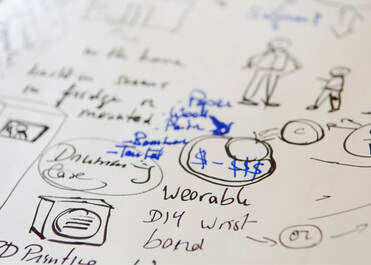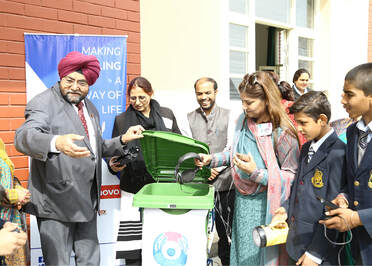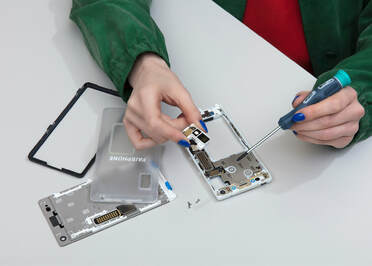Inspiring solutions for more sustainable ICT
The idea behind Transform Together is to help replicate and scale sustainable business and policy solutions already out there. Here we have collated a selection of brilliant real-life examples of sustainable solutions for smartphones and ICT. From design to end-of-life, they show that in many ways we already know how to be sustainable. We just need to make it mainstream – and that is where you can help.
If you are a business, government, procurement professional, civil society organisation, or individual, look through these examples, get inspired and think of an action that you could take in your own sphere of influence.
If you are a business, government, procurement professional, civil society organisation, or individual, look through these examples, get inspired and think of an action that you could take in your own sphere of influence.

Circular Computing: giving laptops a new lease of life
Circular Computing is a laptop remanufacturer. By sourcing bulk amounts of pre-used laptops, restoring them to like-new condition and inserting them back into the market through normal supply channels, it allows corporate and institutional procurement departments to source top quality ICT at a better price and with far better environmental and social outcomes.
Tags: laptop, refurbishment, remanufacturing, procurement, circular economy, product life extension, UK, Europe, Middle East, MENA, USA
Circular Computing is a laptop remanufacturer. By sourcing bulk amounts of pre-used laptops, restoring them to like-new condition and inserting them back into the market through normal supply channels, it allows corporate and institutional procurement departments to source top quality ICT at a better price and with far better environmental and social outcomes.
Tags: laptop, refurbishment, remanufacturing, procurement, circular economy, product life extension, UK, Europe, Middle East, MENA, USA

Closing the Loop: how to offset your phone
Pre-used phones shipped to the developing world can provide great value for the second users, but they create a dangerous buildup of hazardous e-waste which cannot be recycled locally. Closing the Loop is a social enterprise that uses a ‘one for one’ model to retrieve these phones for recycling, so that companies can ensure their procurement of telecoms will help to solve this problem.
Tags: end-of-life, smartphone, mobile phone, circular economy, e-waste, logistics, Basel convention, developing world, procurement, recycling, reuse, legislation, waste policy, urban mining, Africa, Europe
Pre-used phones shipped to the developing world can provide great value for the second users, but they create a dangerous buildup of hazardous e-waste which cannot be recycled locally. Closing the Loop is a social enterprise that uses a ‘one for one’ model to retrieve these phones for recycling, so that companies can ensure their procurement of telecoms will help to solve this problem.
Tags: end-of-life, smartphone, mobile phone, circular economy, e-waste, logistics, Basel convention, developing world, procurement, recycling, reuse, legislation, waste policy, urban mining, Africa, Europe

Designing for sustainability - designing for better systems
Decisions made in the design phase determine most of the environmental impact a product will have during its lifetime. For smartphones and ICT the decisions on materials, computing power and longevity, repairability and recyclability are the most crucial form sustainability perspective. However in order to make a real difference the design decisions need to be backed up by business models that support longevity and circularity.
Tags: design, product life extension, obsolescence, EU Ecodesign, repairability, recyclability, circular design, modularity, materials, business models, system design, consumer behavior
Image credit: Fairphone
Decisions made in the design phase determine most of the environmental impact a product will have during its lifetime. For smartphones and ICT the decisions on materials, computing power and longevity, repairability and recyclability are the most crucial form sustainability perspective. However in order to make a real difference the design decisions need to be backed up by business models that support longevity and circularity.
Tags: design, product life extension, obsolescence, EU Ecodesign, repairability, recyclability, circular design, modularity, materials, business models, system design, consumer behavior
Image credit: Fairphone

Sustainable public procurement: learning from the Netherlands
As the public sector represents a major proportion of ICT demand worldwide, the Dutch government is taking steps to educate its public procurement departments on how to ‘do’ more sustainable procurement. Initiatives include an online resource network, and an experimental Green Deal for Circular Procurement. What has this experiment shown, and how can public buyers across Europe access this knowledge or get involved?
Tags: procurement, public sector, competitive tender, innovation, circular economy, circular procurement, green deal, product as a service, knowledge sharing, pilots, data security
As the public sector represents a major proportion of ICT demand worldwide, the Dutch government is taking steps to educate its public procurement departments on how to ‘do’ more sustainable procurement. Initiatives include an online resource network, and an experimental Green Deal for Circular Procurement. What has this experiment shown, and how can public buyers across Europe access this knowledge or get involved?
Tags: procurement, public sector, competitive tender, innovation, circular economy, circular procurement, green deal, product as a service, knowledge sharing, pilots, data security

Electronics Watch: opening doors for bottom-up monitoring
of factories
Poor working conditions in the supply chain are a major issue for the sustainability and reputation of the ICT industry. External audits do not always reveal labour and human rights abuses, so Electronics Watch uses worker-driven monitoring for better insight and worker empowerment. It also gives procurers tools to engage more effectively for transparency and compliance in their supply chain.
Tags: human rights, safety, monitoring, supply chain, verification, transparency, manufacturing, labour rights
of factories
Poor working conditions in the supply chain are a major issue for the sustainability and reputation of the ICT industry. External audits do not always reveal labour and human rights abuses, so Electronics Watch uses worker-driven monitoring for better insight and worker empowerment. It also gives procurers tools to engage more effectively for transparency and compliance in their supply chain.
Tags: human rights, safety, monitoring, supply chain, verification, transparency, manufacturing, labour rights

Powering green ICT and smartphones
Manufacturing growing volumes of smartphones and other ICT products consumes vast amounts of energy, coupled by the increasing demand for energy that enables data transmission for online use of these devices. Extending the lifetime of products thus avoiding the energy demand from producing new devices is the obvious answer but what else can be done in order to decarbonise global ICT supply chains?
Tags: ICT energy demand, greenhouse gas emissions, decarbonising, renewable energy, networks, data transmission, data centres, energy-efficiency, energy policy, zero carbon, RE100, carbon targets
Manufacturing growing volumes of smartphones and other ICT products consumes vast amounts of energy, coupled by the increasing demand for energy that enables data transmission for online use of these devices. Extending the lifetime of products thus avoiding the energy demand from producing new devices is the obvious answer but what else can be done in order to decarbonise global ICT supply chains?
Tags: ICT energy demand, greenhouse gas emissions, decarbonising, renewable energy, networks, data transmission, data centres, energy-efficiency, energy policy, zero carbon, RE100, carbon targets

Karo Sambhav: creating a cohesive e-waste movement in India
India is the world’s fourth largest producer of e-waste. 95% of this is processed by the informal sector, often in precarious conditions with unregulated environmental impacts. To tackle this, India adopted ‘Extended Producer Responsibility’ legislation, making producers responsible for the e-waste. How does Karo Sambhav help electronics producers to meet their EPR obligations while engaging with the informal sector to strengthen their livelihoods?
Tags: e-waste, EPR, extended producer responsibility, waste policy, waste legislation, informal sector, formalisation, developing world, India, recycling, sustainable livelihoods
India is the world’s fourth largest producer of e-waste. 95% of this is processed by the informal sector, often in precarious conditions with unregulated environmental impacts. To tackle this, India adopted ‘Extended Producer Responsibility’ legislation, making producers responsible for the e-waste. How does Karo Sambhav help electronics producers to meet their EPR obligations while engaging with the informal sector to strengthen their livelihoods?
Tags: e-waste, EPR, extended producer responsibility, waste policy, waste legislation, informal sector, formalisation, developing world, India, recycling, sustainable livelihoods

Getting responsibly-sourced materials into electronics
Many of the materials used in ICT are linked to conflict, resource depletion, unsafe labour and environmental damage. It is difficult for manufacturers to trace them back to source. Conflict minerals legislation has deepened poverty in some countries. Various industry initiatives and brands are working to improve mining conditions and transparency throughout the supply chain, while supporting communities that rely on the mining industry. Recycled metals also represent a promising way forward.
Tags: OECD guidelines, Dodd-Frank, conflict minerals, Africa, mining, metals, supply chain, policy, transparency, recycled, materials, resources, materiality, Fairmined, Fairtrade, Fairphone, raw material sourcing
Many of the materials used in ICT are linked to conflict, resource depletion, unsafe labour and environmental damage. It is difficult for manufacturers to trace them back to source. Conflict minerals legislation has deepened poverty in some countries. Various industry initiatives and brands are working to improve mining conditions and transparency throughout the supply chain, while supporting communities that rely on the mining industry. Recycled metals also represent a promising way forward.
Tags: OECD guidelines, Dodd-Frank, conflict minerals, Africa, mining, metals, supply chain, policy, transparency, recycled, materials, resources, materiality, Fairmined, Fairtrade, Fairphone, raw material sourcing

Phone-as-a-service: banishing the linear ownership model
Smartphones are often used for a relatively short period, especially by large organisations. Many smartphone producers’ business model relies on this rapid buy-and-replace model. Meanwhile, phones are generally not optimally maintained, and go unrecycled after being replaced. Fairphone is bucking the market by offering to supply phones ‘as a service’ – but what does this mean for sustainability and responsibility across the life-cycle of the device?
Tags: Fairphone, product-as-a-service, circular economy, procurement, circular procurement, data security, innovation, business model, modularity, product life extension, ownership, device performance
Image credit: Fairphone
Smartphones are often used for a relatively short period, especially by large organisations. Many smartphone producers’ business model relies on this rapid buy-and-replace model. Meanwhile, phones are generally not optimally maintained, and go unrecycled after being replaced. Fairphone is bucking the market by offering to supply phones ‘as a service’ – but what does this mean for sustainability and responsibility across the life-cycle of the device?
Tags: Fairphone, product-as-a-service, circular economy, procurement, circular procurement, data security, innovation, business model, modularity, product life extension, ownership, device performance
Image credit: Fairphone

Eco-labels: how to demand comprehensive change with a single procurement choice
Because of the complexity of ICT and the rapid innovation throughout the industry, it is highly challenging for procurement departments to keep up with ‘what sustainability looks like’ in each product they need. It’s even more complex to get all the necessary criteria into supply contracts. Can an eco-labels cut through the chaos – to let buyers put their weight behind sustainability with a single ‘ask’?
Tags: TCO Certified, eco-label, independent verification, audits, manufacturing, supply chain, procurement, EPEAT, Blue Angel, ECOLOGO, transparency, safety, human rights, device performance
Because of the complexity of ICT and the rapid innovation throughout the industry, it is highly challenging for procurement departments to keep up with ‘what sustainability looks like’ in each product they need. It’s even more complex to get all the necessary criteria into supply contracts. Can an eco-labels cut through the chaos – to let buyers put their weight behind sustainability with a single ‘ask’?
Tags: TCO Certified, eco-label, independent verification, audits, manufacturing, supply chain, procurement, EPEAT, Blue Angel, ECOLOGO, transparency, safety, human rights, device performance


